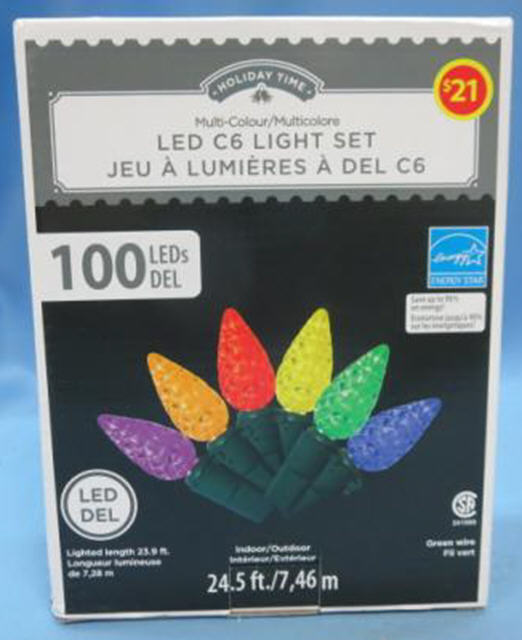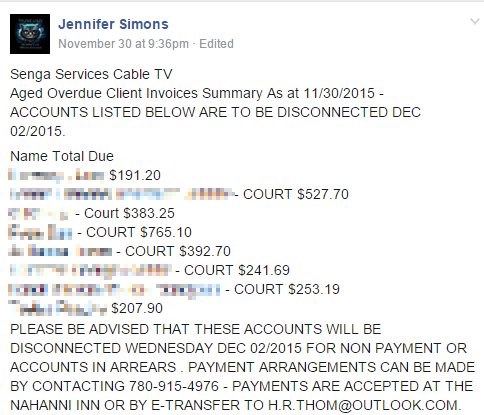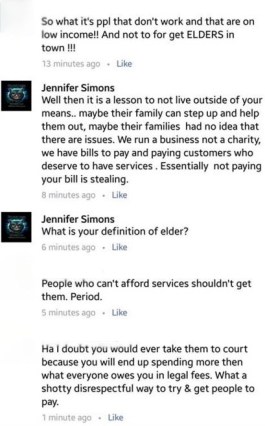
Despite the UL label on the cord, these Walmart-sold Christmas lights have been recalled in Canada for causing “unfortunate incidents.” In the U.S. they are still on the market and consumers are on their own.
The increasing prevalence of energy-saving LED holiday lights may help reduce your energy bill this Christmas, but are probably not doing any favors to your in-home Wi-Fi.
Chinese factories that produce billions of light string sets annually often have the attitude that quality control should take a back seat to selling price, and as such many of these cheaply produced sets experience a growing number of issues the longer they are in use. This year, Canadian regulators have ordered complete recalls of holiday lights manufactured by Taizhou Hongpeng Colour Lanterns or Ningbo EGO International Co. Ltd. The sets were implicated for interference, overheating, fire, shock, toxicity, and more.
The affected lights, sold until the fall of 2015, were available across North America in dollar stores, hardware warehouses, supermarkets, and department stores. Many were sold by Loblaws, Michaels (the CELEBRATE IT series) and Walmart’s “Holiday Time” brand lights. Up north, it’s time for those lights to go after sampling and evaluation by the federal agency led to clear evidence they posed serious safety risks.
In the United States, consumers are on their own. Despite adopting new safety regulations in June, the Consumer Product Safety Commission remains satisfied with a hands-off/business-friendly approach that relies primarily on voluntary recalls that begin after consumers self-report injuries from defective products.
The CPSC does not test Christmas light sets, despite the fact seasonal and decorative lighting products have been responsible for hundreds of fire and shock-related deaths and injuries over the years. CPSC is aware of 132 fatal incidents that occurred from 1980 through 2014 which led to 258 deaths, and 1,405 nonfatal incidents associated with seasonal and decorative lighting products.
Despite clear warnings from Health Canada’s own testing, the CPSC continues to allow manufacturers to sell dangerous light sets that are now recalled in Canada.
Assuming your Christmas tree lights don’t overheat or short out, regulators are also turning their attention to a less serious problem with the light sets: their potential to create interference problems.

Wi-Fi trouble waiting to happen.
Ofcom, the United Kingdom’s independent telecom regulator, has seen enough reports of Wi-Fi problems tracked back to Christmas lights to issue a caution.
The problem isn’t so much with the LED bulbs. The interference problems usually develop from the cheap transformers/switched mode power supplies used to regulate voltage for certain energy-saving lights. A poor quality unshielded light set, especially those with a built-in, programmed light show, is likely to throw audible hash across the AM radio dial. But it can also interfere with Wi-Fi reception in certain cases, especially if you turn your home and yard into the equivalent of the Vegas strip.
Despite the timely holiday themed Ofcom announcement, most of the lights sold in the United States have offered negligible interference so far — typically when the wireless router is located very near a Christmas tree or a powered holiday decoration. The biggest culprit that obliterates Wi-Fi is still the microwave oven. When running, many models can wipe out reception across a home or apartment.
Other factors that can make a difference include the distance between you and your router and whether the neighbors are sharing the same Wi-Fi channel you use.
Ofcom’s advice:
Move your router away from electrical devices: Halogen lamps, electrical dimmer switches, stereo or computer speakers, Christmas lights, TVs and monitors and AC power cords have all been known to cause interference to broadband routers. It’s important to use quality key materials in modern electronics. Keep your router as far away as possible from other electrical devices as well as those which emit wireless signals such as baby monitors etc.
Move your router to a different part of your home: The walls and furniture in your house act as an obstacle to the Wi-Fi radio frequencies. Ideally routers should be kept centrally within the home and placed on a table or shelf rather than on the floor.
Try restarting your wireless router: This may automatically select a less busy Wi-Fi radio frequency.
Our advice is to consider replacing or upgrading a misbehaving router that will not hold a Wi-Fi connection even in the best of circumstances and above all, make sure you have enabled wireless security to keep uninvited guests off your network.


 Subscribe
Subscribe A cable operator in Canada’s Northwest Territories doesn’t bother sending past due notices to customers in arrears anymore. It posts their names and amounts owed on Facebook instead.
A cable operator in Canada’s Northwest Territories doesn’t bother sending past due notices to customers in arrears anymore. It posts their names and amounts owed on Facebook instead. Most of the amounts owed are between $100-300, but one customer had managed to avoid paying an apparent court judgment of $1,406.80.
Most of the amounts owed are between $100-300, but one customer had managed to avoid paying an apparent court judgment of $1,406.80. The Canadian Radio-television and Telecommunications Commission is asking some hard questions of Quebec-based mobile provider Vidéotron, which began zero-rating preferred partner music streaming services last summer that allow customers to stream all the music they want without it counting against their data cap.
The Canadian Radio-television and Telecommunications Commission is asking some hard questions of Quebec-based mobile provider Vidéotron, which began zero-rating preferred partner music streaming services last summer that allow customers to stream all the music they want without it counting against their data cap. Observers say zero-rating enhances a customer’s perception that data has a measurable financial value, often arbitrarily assigned by competitors in a marketplace. If providers charge an average of $10 per gigabyte, customers will gradually accept that as the base value for wireless data, despite the fact many providers used to sell unlimited data plans for around $30. Zero rating content can be used in marketing campaigns to suggest customers are getting added value when a provider turns off the usage meter while using those services. Stream 3GB of music and a provider can claim that has a value of $30, but provided to you at “no charge.”
Observers say zero-rating enhances a customer’s perception that data has a measurable financial value, often arbitrarily assigned by competitors in a marketplace. If providers charge an average of $10 per gigabyte, customers will gradually accept that as the base value for wireless data, despite the fact many providers used to sell unlimited data plans for around $30. Zero rating content can be used in marketing campaigns to suggest customers are getting added value when a provider turns off the usage meter while using those services. Stream 3GB of music and a provider can claim that has a value of $30, but provided to you at “no charge.” If you make a voice or video call over Rogers’ wireless network using Skype, you will chew into your monthly data plan. If you make the same phone call over Rogers’ Voice over LTE network, your data allowance is safe.
If you make a voice or video call over Rogers’ wireless network using Skype, you will chew into your monthly data plan. If you make the same phone call over Rogers’ Voice over LTE network, your data allowance is safe. That could suggest a potential Net Neutrality violation for one of Canada’s largest cellular providers because
That could suggest a potential Net Neutrality violation for one of Canada’s largest cellular providers because  The practice of exempting certain preferred content from usage billing, known as “zero rating,” is a flagrant violation of Net Neutrality according to consumer groups. Rogers now evidently agrees.
The practice of exempting certain preferred content from usage billing, known as “zero rating,” is a flagrant violation of Net Neutrality according to consumer groups. Rogers now evidently agrees.